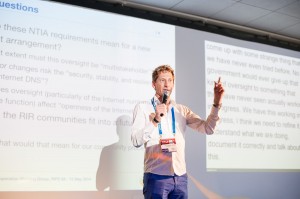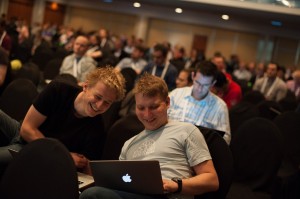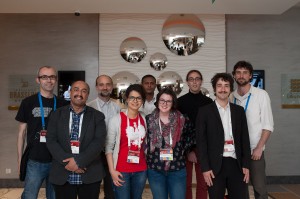Thursday saw 564 attendees checked in to RIPE 68. Some RIPE Working Groups bid farewell to familiar faces and new chairs were welcomed.
Following the closure of the EIX Working Group, the Connect Birds of a Feather (BoF) session took place. David Kessens announced that he is stepping down as IPv6 Working Group Chair. As Shane Kerr and Marco Hogewoning plan to rotate out from their IPv6 Working Group Chair roles, a number of people stepped up during the IPv6 Working Group session to take the helm. The process of selecting new chairs will be continued on the IPv6 Working Group mailing list.
 Steered by its new collective of chairs, the Cooperation Working Group, for the first time, was conducted over two sessions. Along with presentations covering a variety of issues, there was a community discussion of the NTIA’s intention to transition out of IANA oversight. The chairs closed the sessions by expressing their hopes for the working group moving forward, acting, particularly, as a RIPE “brains trust” for engaging with public policy issues relating to the Internet.
Steered by its new collective of chairs, the Cooperation Working Group, for the first time, was conducted over two sessions. Along with presentations covering a variety of issues, there was a community discussion of the NTIA’s intention to transition out of IANA oversight. The chairs closed the sessions by expressing their hopes for the working group moving forward, acting, particularly, as a RIPE “brains trust” for engaging with public policy issues relating to the Internet.
The Measurements, Analysis and Tools (MAT) Working Group session included several research talks about how RIPE Atlas data can be used, as well as a talk about Internet-wide active scanning, delivered by Zakir Durumeric, University of Michigan. He discussed the ethics of active Internet scanning using ZMap, an open source IPv4 address scanning tool available to larger research institutions. His research discovered that 1% of private keys being randomly generated on the Internet have duplicates, leaving those hosts, which are often not regularly updated, vulnerable to attacks. An interesting discussion ensued about the ethics of this kind of scanning and how to best share the collected data.
The RIPE NCC’s Marco Hogewoning’s presentation on interactions between the RIPE NCC and Law Enforcement Agencies provoked lively discussion within the Anti-Abuse Working Group about the level of transparency regarding details of content, attendees, and organisations at LEA meetings. There were requests from the floor for “attendee lists” to be published for these meetings and Marco agreed to investigate the possibility of producing this. However, there was some agreement amongst participants that an appropriate balance must be found, a balance between providing the privacy that these organisations and their attendees require, and providing enough information to the community.
 Documentation was a recurrent topic throughout the day. In the Routing Working Group session, Benno Overeinder, NLnet Labs, explained that RDL is all about not configuring routers but documenting and programming the AS. Job Snijders presented on documenting automated prefix filtering and, in the Anti-Abuse Working Group session, there were discussions regarding the reporting of abuse and what guidelines might be required. The RIPE NCC’s Denis Walker stated that if there is a demand for guidelines regarding what sort of reports should be sent regarding abuse, and how people should respond to them, then the text should come from the community. Ruediger Volk, Deutsche Telekom, agreed, commenting that it is “meaningless” to do validation beyond the mechanic without guidelines.
Documentation was a recurrent topic throughout the day. In the Routing Working Group session, Benno Overeinder, NLnet Labs, explained that RDL is all about not configuring routers but documenting and programming the AS. Job Snijders presented on documenting automated prefix filtering and, in the Anti-Abuse Working Group session, there were discussions regarding the reporting of abuse and what guidelines might be required. The RIPE NCC’s Denis Walker stated that if there is a demand for guidelines regarding what sort of reports should be sent regarding abuse, and how people should respond to them, then the text should come from the community. Ruediger Volk, Deutsche Telekom, agreed, commenting that it is “meaningless” to do validation beyond the mechanic without guidelines.
 The day closed with three candidates from the RIPE Academic Cooperation Initiative (RACI), who presented their research to members of the community at the RACI BoF session.
The day closed with three candidates from the RIPE Academic Cooperation Initiative (RACI), who presented their research to members of the community at the RACI BoF session.










